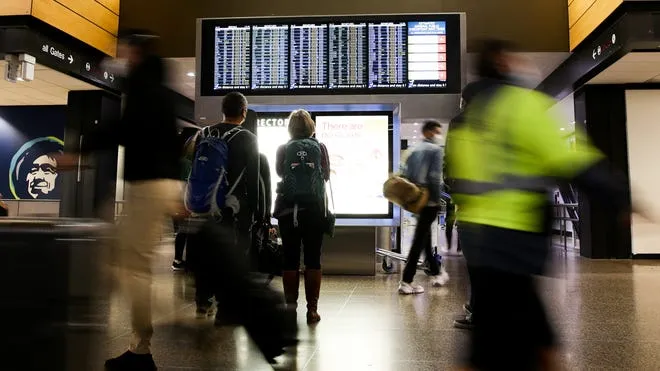The Impending Crisis: How Proposed Credit Card Legislation Threatens Frequent Flyer Rewards
In an era where consumer loyalty is increasingly hard-won, frequent flyer programs represent a critical asset for both airlines and their devoted customers. However, impending legislative changes surrounding credit card fees could destabilize this delicate ecosystem, potentially impacting millions of frequent flyers across the United States.
Background on Airline Loyalty Programs
Frequent flyer programs (FFPs) have evolved dramatically since their inception in the late 20th century. Originating as simple point accumulation systems, these programs now intertwine complex partnerships with credit card companies, allowing customers to earn miles and rewards that can be redeemed for flights, upgrades, and other perks. The attractiveness of these programs has driven consumer loyalty, influencing travel decisions significantly.
Currently, major airlines such as Delta, American Airlines, and United Airlines offer robust FFPs that not only provide flight rewards but also feature collaborations with various retailers, hotels, and other service providers. The synergy between credit card companies and airlines enhances the appeal of these rewards, making it easier for consumers to accumulate miles.
The Proposed Legislation
In response to consumer grievances about high fees and interest rates associated with credit card use, lawmakers are contemplating legislation aimed at regulating these charges. Proposed bills focus on enhancing transparency and reducing fees charged to merchants. Airlines argue that these changes could have detrimental effects on their FFPs.
Specifically, airlines have warned that reduced fees charged to credit card companies would likely prompt a decrease in the rewards offered to frequent flyers. This concern is grounded in the fundamental business model that fuels FFPs, as airlines benefit significantly from the co-branded credit card partnerships that drive consumer engagement and loyalty.
Major Airlines’ Concerns
Major airlines have not been shy about expressing their concerns regarding this legislation. In a recent statement, the CEO of Delta Air Lines remarked, “If this legislation passes, we will likely have to rethink our entire approach to rewarding our loyal customers. The math just doesn’t add up when you consider the impact on our bottom line.”
American Airlines and United Airlines echoed similar sentiments, indicating that rewarding customers via frequent flyer programs may no longer be feasible if the revenue streams from credit card partnerships are compromised. This potential shift could lead to a devaluation of miles and points, altering the landscape of travel rewards as we know it.
The Ripple Effects on Consumers
If these proposed changes come to fruition, loyal customers could bear the brunt of the fallout. Frequent flyers may find themselves losing much of the value attached to their accumulated miles, which could force travelers to rethink their allegiance to specific airlines. This shift may produce a backlash against companies that drastically reduce rewards, further complicating the competitive dynamics of the airline industry.
For example, seasoned travelers may yearn for specific loyalty perks, like free upgrades, additional baggage, or priority boarding, which may become less accessible as airlines grapple with revenue cuts. Additionally, consumers heavily reliant on co-branded credit cards for traveling rewards may need to consider alternative financial products that still offer competitive rewards without the constraints imposed by the legislation.
The Broader Financial Landscape
This potential crisis extends beyond airlines and travelers; it also impacts the market dynamics of credit card companies and their partnerships. Fintech companies are on the verge of exploding in popularity, with innovative products that challenge traditional models heading towards the mainstream.
If FFPs dwindle due to reduced credit card revenues, consumers will undoubtedly turn to alternative means of earning rewards, compelling credit card companies to adapt rapidly to stay relevant in a competitive landscape. The rise of cryptocurrencies as a form of reward is also an area ripe for exploration, with potential for a paradigm shift in how consumers earn and spend rewards.
Understanding Consumer Sentiment
To gauge consumer sentiment towards these potential legislative changes, various surveys have been conducted. Recent polls indicate that a significant majority of frequent flyers prioritize loyalty programs as a determining factor in choosing an airline. Respondents expressed deep concerns about the erosion of rewards and benefits tied to frequent flyer status, with many stating they would consider switching airlines should the rewards degrade.
Interestingly, there’s also a growing sentiment towards alternative reward systems, with consumers increasingly open to options that incorporate the use of cryptocurrencies. This cultural shift towards embracing digital currencies could usher in a new wave of loyalty programs that transcend traditional models.
Steps Airlines Can Take
Given the ominous potential of this legislative change, airlines have a unique opportunity to fortify their allegiance with customers and be proactive in addressing looming fears. For starters, airlines can engage in transparent dialogues with their customers, sharing insights about the proposed changes and their potential impacts. Open communication can foster trust and understanding, helping to alleviate customer anxiety.
Furthermore, airlines could explore diversifying their revenue streams beyond traditional FFPs. This might include innovating reward partnerships with other industries or extending collaborations with fintech companies wherein travelers can earn rewards through various forms, including cryptocurrencies.
Concluding Thoughts
The discussions surrounding credit card fees and their potential implications on frequent flyer rewards are far from settled. While the proposed legislation aims to protect consumers from financial burdens imposed by credit card companies, it carries the risk of destabilizing an essential aspect of the travel experience. As stakeholders in the airline industry navigate this complex challenge, one thing is clear: the voices of frequent flyers will undoubtedly shape the outcome of this legislative discourse.
The fate of frequent flyer programs now rests in a precarious balance between consumer protection efforts and the airline industry’s commitment to rewarding loyalty. With consumer behavior rapidly evolving, the industry must adapt or risk losing relevance in a competitive marketplace.







